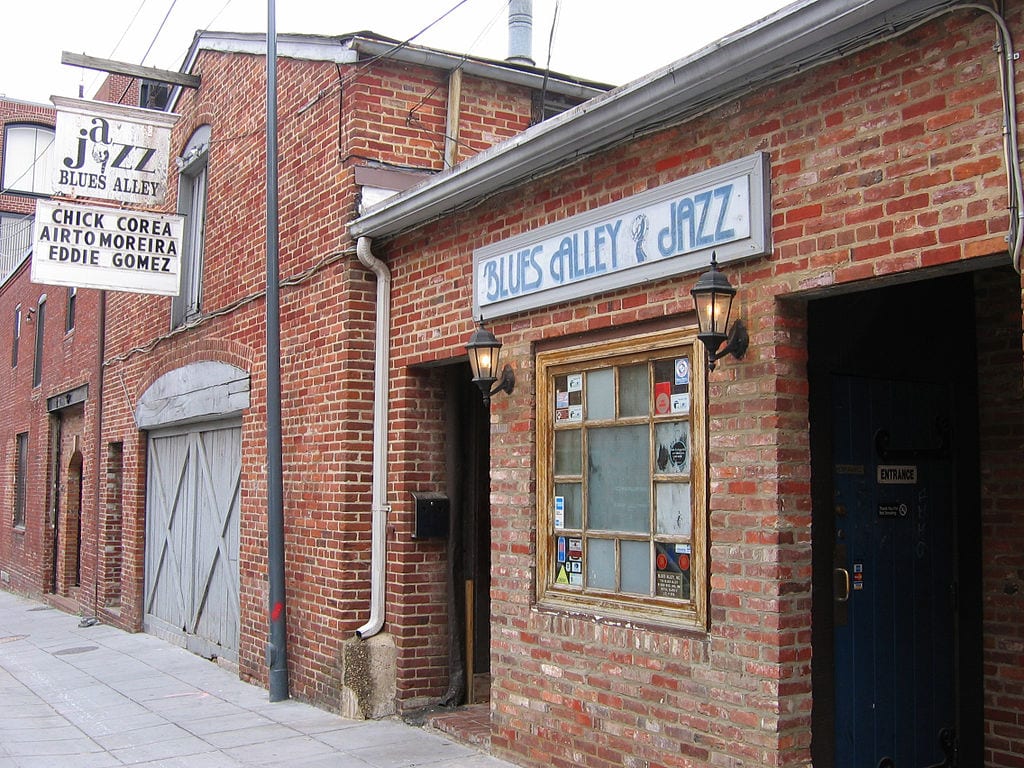Georgetown’s Blues Alley: Another Pandemic Casualty?
By • February 18, 2021 0 2891

Founded in 1965, Blues Alley, which calls itself the nation’s “oldest continuously operating jazz supper club,” might have to close its doors in Georgetown for good. That’s if owner Harry Schnipper is unable to renegotiate the club’s lease with Snyder Properties in the coming months — a challenge for both parties, since the District continues to prohibit live music indoors.
Asked by The Georgetowner for comment on Blues Alley’s lease negotiations, Schnipper said: “I am actually not in control of the narrative. Our landlord placed the property for sale and so I suggest you speak to our landlord.” At press time, Karen Snyder of Snyder Properties responded to The Georgetowner’s inquiry by stating, referring to Schnipper: “The ball is in his court.”
Known as “the house that Dizzy built,” Blues Alley has played host to the greatest names in the history of jazz, including Dizzy Gillespie, Ella Fitzgerald, Sarah Vaughan, Sonny Rollins, Charlie Mingus, Tony Bennett, Stan Getz, Eva Cassidy and Chick Corea. A major D.C. tourist destination, the club — situated in a turn-of-the-century brick carriage house nestled in the alleyway at 1073 Wisconsin Ave. NW — is also renowned for its speakeasy feel, cozy 125-seat capacity and candlelit intimacy. Its other attributes include “authentic Creole cuisine,” cocktails named for jazz greats, diverse audiences, incubation of local talent, promotion of world music, all-ages admission and educational outreach.
NBC4 reported that Snyder said “she repeatedly tried to renegotiate the lease” with Schnipper, “but those negotiations were unsuccessful.” Schnipper confirmed to DCist, part of WAMU, that Blues Alley was “looking for a new space.”
Since last March, Blues Alley has sought to boost revenues lost due to the pandemic with ticket sales to performances streamed from the National Press Club, online merchandise sales and a staff GoFundMe page. Prior to the pandemic, the club was experiencing one of its most profitable years ever, according to Kris Ross, former operations manager.
In a WAMU radio broadcast on the D.C. jazz scene, recorded prior to the pandemic, co-hosts Mikaela Lefrak and Sasha-Ann Simons asked DC Jazz Festival Executive Director Sunny Sumter about the importance of Blues Alley to the District. “I would definitely tell you to come to Blues Alley, because it’s our institution,” said Sumter. “It’s our jazziest club in D.C. I would say that bar-none.”
The hosts explored the District’s critical role in jazz history, noting that legendary composer Duke Ellington was born here in 1899, about a mile from Georgetown, and that Embassy Row provided nonsegregated venues for his orchestra at the height of the Jim Crow era. Lefrak also fondly recalled playing the alto sax at Blues Alley with her Georgetown Day School band the Hoppers.
Meanwhile, news of Blues Alley’s possible shuttering prompted a crescendo of lamentations in the media. Following an NBC4 report, local anchor Leon Harris vamped to co-anchor Doreen Gentzler, “We’ve both been to Blues Alley,” adding that he had visited “hundreds and hundreds of times.” Harris continued: “It was a second home for me. We’ve got to find a way to make it work!”
On WUSA9, following the station’s Blues Alley story, local anchor Tony Perkins ad-libbed, “I don’t know about you guys, but I’ve been to this venue many times over the years and it’s a treasure.” To which co-anchor Allison Seymour responded: “I’ll really miss that whole location, just the whole energy, the vibe. It’s really just sad. It’s heartbreaking.”
Local jazz star Arturo Sandoval, one of Dizzy Gillespie’s protégés, tweeted: “I played in this club so many times over the years; it was one of my favorite jazz clubs in the US; it’s sad news.”
On the Blues Alley website, the club expressed hope it might reopen after “a plurality of Americans” are vaccinated against COVID-19. The club’s current lease is due to expire by June of 2022.

